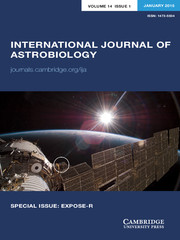As readers and contributors to International Journal of Astrobiology (IJA) we always appreciate the editors accepting, subject to review, papers containing new and original ideas and extrapolations of current knowledge. However, one needs to be careful not to cross the subtle border with Science Fiction. ‘Warp drive’ by way of example, is an interesting invention of Sci.Fi., but unfortunately, with no basis in science.
Edwards’ recent IJA article Reference EdwardsEdwards makes entertaining reading, but in our opinion is beyond this limit. It takes up various suggestions that humanity should escape a depleted Earth colonising other planets (or return to a post-apocalypse Earth). His proposal centres around sending frozen embryos, which is even less feasible than the well-known idea of sending frozen adults. A few specific problems with Edwards’ paper:
(1) Any solution with current spaceflight technology is impractical, as much faster space flight technologies will probably appear long before the original spaceships arrive at even the nearest solar systems (‘Grandchildren arriving before the parents’ paradox). Even if the planet Proxima b, orbiting our nearest star, Proxima Centauri, is found to be suited for human settling, using present spaceships it would take thousands of generations to get there.
(2) Even suggested spaceflight technologies such as laser sail, like Starshot Breakthrough with nano-spaceships, or Bussard ramjet propellant systems, to move larger payloads and people over interstellar distances, although far from being feasible today, are more reasonable future solutions than a mission with present technology that would last ~105 years.
(3) Even if humanity will in the future develop advanced propulsion systems that will make interstellar flight to nearby solar systems more reasonable time-wise, they will probably remain unfeasible energy- and cost-wise, while less ambitious solutions for escaping a depleted Earth could be considered within our Solar System, such as settling Mars and Jupiter's satellites or building O'Neil-type space colonies.
(4) The problems that Edwards’ proposed expeditions would encounter (even if the mechanical, automatic systems survive thousands of years) are enormous, and we find it hard to believe that extrapolations of today's science, technology and sociology, can suggest solutions.
(5) Edwards proposes that his methodology would solve the civilisation longevity problem in Drake's equation; in that case, however, one would be confronted with Fermi's Paradox.
Edwards’ paper could perhaps be a good script for a Sci.Fi. movie, but we doubt whether it's a serious contribution to the science of Astrobiology.



